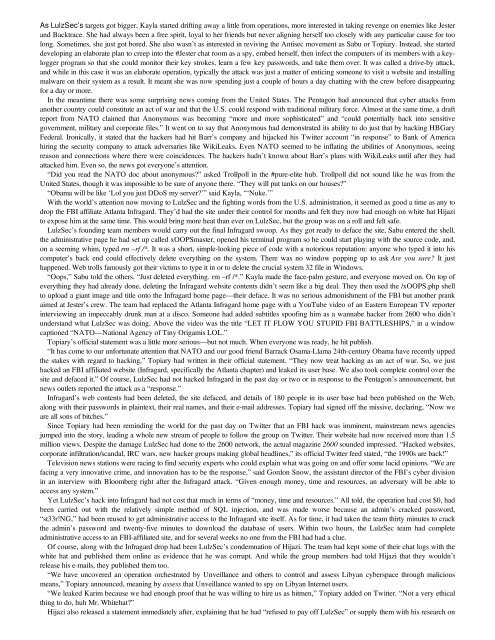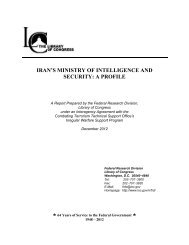We are anonymous inside the hacker world of lulzse
We are anonymous inside the hacker world of lulzse
We are anonymous inside the hacker world of lulzse
Create successful ePaper yourself
Turn your PDF publications into a flip-book with our unique Google optimized e-Paper software.
As LulzSec’s targets got bigger, Kayla started drifting away a little from operations, more interested in taking revenge on enemies like Jester<br />
and Backtrace. She had always been a free spirit, loyal to her friends but never aligning herself too closely with any particular cause for too<br />
long. Sometimes, she just got bored. She also wasn’t as interested in reviving <strong>the</strong> Antisec movement as Sabu or Topiary. Instead, she started<br />
developing an elaborate plan to creep into <strong>the</strong> #Jester chat room as a spy, embed herself, <strong>the</strong>n infect <strong>the</strong> computers <strong>of</strong> its members with a keylogger<br />
program so that she could monitor <strong>the</strong>ir key strokes, learn a few key passwords, and take <strong>the</strong>m over. It was called a drive-by attack,<br />
and while in this case it was an elaborate operation, typically <strong>the</strong> attack was just a matter <strong>of</strong> enticing someone to visit a website and installing<br />
malw<strong>are</strong> on <strong>the</strong>ir system as a result. It meant she was now spending just a couple <strong>of</strong> hours a day chatting with <strong>the</strong> crew before disappearing<br />
for a day or more.<br />
In <strong>the</strong> meantime <strong>the</strong>re was some surprising news coming from <strong>the</strong> United States. The Pentagon had announced that cyber attacks from<br />
ano<strong>the</strong>r country could constitute an act <strong>of</strong> war and that <strong>the</strong> U.S. could respond with traditional military force. Almost at <strong>the</strong> same time, a draft<br />
report from NATO claimed that Anonymous was becoming “more and more sophisticated” and “could potentially hack into sensitive<br />
government, military and corporate files.” It went on to say that Anonymous had demonstrated its ability to do just that by hacking HBGary<br />
Federal. Ironically, it stated that <strong>the</strong> <strong>hacker</strong>s had hit Barr’s company and hijacked his Twitter account “in response” to Bank <strong>of</strong> America<br />
hiring <strong>the</strong> security company to attack adversaries like WikiLeaks. Even NATO seemed to be inflating <strong>the</strong> abilities <strong>of</strong> Anonymous, seeing<br />
reason and connections where <strong>the</strong>re were coincidences. The <strong>hacker</strong>s hadn’t known about Barr’s plans with WikiLeaks until after <strong>the</strong>y had<br />
attacked him. Even so, <strong>the</strong> news got everyone’s attention.<br />
“Did you read <strong>the</strong> NATO doc about <strong>anonymous</strong>?” asked Trollpoll in <strong>the</strong> #pure-elite hub. Trollpoll did not sound like he was from <strong>the</strong><br />
United States, though it was impossible to be sure <strong>of</strong> anyone <strong>the</strong>re. “They will put tanks on our houses?”<br />
“Obama will be like ‘Lol you just DDoS my server?’” said Kayla, “‘Nuke.’”<br />
With <strong>the</strong> <strong>world</strong>’s attention now moving to LulzSec and <strong>the</strong> fighting words from <strong>the</strong> U.S. administration, it seemed as good a time as any to<br />
drop <strong>the</strong> FBI affiliate Atlanta Infragard. They’d had <strong>the</strong> site under <strong>the</strong>ir control for months and felt <strong>the</strong>y now had enough on white hat Hijazi<br />
to expose him at <strong>the</strong> same time. This would bring more heat than ever on LulzSec, but <strong>the</strong> group was on a roll and felt safe.<br />
LulzSec’s founding team members would carry out <strong>the</strong> final Infragard swoop. As <strong>the</strong>y got ready to deface <strong>the</strong> site, Sabu entered <strong>the</strong> shell,<br />
<strong>the</strong> administrative page he had set up called xOOPSmaster, opened his terminal program so he could start playing with <strong>the</strong> source code, and,<br />
on a seeming whim, typed rm –rf /*. It was a short, simple-looking piece <strong>of</strong> code with a notorious reputation: anyone who typed it into his<br />
computer’s back end could effectively delete everything on <strong>the</strong> system. There was no window popping up to ask Are you sure? It just<br />
happened. <strong>We</strong>b trolls famously got <strong>the</strong>ir victims to type it in or to delete <strong>the</strong> crucial system 32 file in Windows.<br />
“Oops,” Sabu told <strong>the</strong> o<strong>the</strong>rs. “Just deleted everything. rm –rf /*.” Kayla made <strong>the</strong> face-palm gesture, and everyone moved on. On top <strong>of</strong><br />
everything <strong>the</strong>y had already done, deleting <strong>the</strong> Infragard website contents didn’t seem like a big deal. They <strong>the</strong>n used <strong>the</strong> /xOOPS.php shell<br />
to upload a giant image and title onto <strong>the</strong> Infragard home page—<strong>the</strong>ir deface. It was no serious admonishment <strong>of</strong> <strong>the</strong> FBI but ano<strong>the</strong>r prank<br />
aimed at Jester’s crew. The team had replaced <strong>the</strong> Atlanta Infragard home page with a YouTube video <strong>of</strong> an Eastern European TV reporter<br />
interviewing an impeccably drunk man at a disco. Someone had added subtitles spo<strong>of</strong>ing him as a wannabe <strong>hacker</strong> from 2600 who didn’t<br />
understand what LulzSec was doing. Above <strong>the</strong> video was <strong>the</strong> title “LET IT FLOW YOU STUPID FBI BATTLESHIPS,” in a window<br />
captioned “NATO—National Agency <strong>of</strong> Tiny Origamis LOL.”<br />
Topiary’s <strong>of</strong>ficial statement was a little more serious—but not much. When everyone was ready, he hit publish.<br />
“It has come to our unfortunate attention that NATO and our good friend Barrack Osama-Llama 24th-century Obama have recently upped<br />
<strong>the</strong> stakes with regard to hacking,” Topiary had written in <strong>the</strong>ir <strong>of</strong>ficial statement. “They now treat hacking as an act <strong>of</strong> war. So, we just<br />
hacked an FBI affiliated website (Infragard, specifically <strong>the</strong> Atlanta chapter) and leaked its user base. <strong>We</strong> also took complete control over <strong>the</strong><br />
site and defaced it.” Of course, LulzSec had not hacked Infragard in <strong>the</strong> past day or two or in response to <strong>the</strong> Pentagon’s announcement, but<br />
news outlets reported <strong>the</strong> attack as a “response.”<br />
Infragard’s web contents had been deleted, <strong>the</strong> site defaced, and details <strong>of</strong> 180 people in its user base had been published on <strong>the</strong> <strong>We</strong>b,<br />
along with <strong>the</strong>ir passwords in plaintext, <strong>the</strong>ir real names, and <strong>the</strong>ir e-mail addresses. Topiary had signed <strong>of</strong>f <strong>the</strong> missive, declaring, “Now we<br />
<strong>are</strong> all sons <strong>of</strong> bitches.”<br />
Since Topiary had been reminding <strong>the</strong> <strong>world</strong> for <strong>the</strong> past day on Twitter that an FBI hack was imminent, mainstream news agencies<br />
jumped into <strong>the</strong> story, leading a whole new stream <strong>of</strong> people to follow <strong>the</strong> group on Twitter. Their website had now received more than 1.5<br />
million views. Despite <strong>the</strong> damage LulzSec had done to <strong>the</strong> 2600 network, <strong>the</strong> actual magazine 2600 sounded impressed. “Hacked websites,<br />
corporate infiltration/scandal, IRC wars, new <strong>hacker</strong> groups making global headlines,” its <strong>of</strong>ficial Twitter feed stated, “<strong>the</strong> 1990s <strong>are</strong> back!”<br />
Television news stations were racing to find security experts who could explain what was going on and <strong>of</strong>fer some lucid opinions. “<strong>We</strong> <strong>are</strong><br />
facing a very innovative crime, and innovation has to be <strong>the</strong> response,” said Gordon Snow, <strong>the</strong> assistant director <strong>of</strong> <strong>the</strong> FBI’s cyber division<br />
in an interview with Bloomberg right after <strong>the</strong> Infragard attack. “Given enough money, time and resources, an adversary will be able to<br />
access any system.”<br />
Yet LulzSec’s hack into Infragard had not cost that much in terms <strong>of</strong> “money, time and resources.” All told, <strong>the</strong> operation had cost $0, had<br />
been carried out with <strong>the</strong> relatively simple method <strong>of</strong> SQL injection, and was made worse because an admin’s cracked password,<br />
“st33r!NG,” had been reused to get administrative access to <strong>the</strong> Infragard site itself. As for time, it had taken <strong>the</strong> team thirty minutes to crack<br />
<strong>the</strong> admin’s password and twenty-five minutes to download <strong>the</strong> database <strong>of</strong> users. Within two hours, <strong>the</strong> LulzSec team had complete<br />
administrative access to an FBI- affiliated site, and for several weeks no one from <strong>the</strong> FBI had had a clue.<br />
Of course, along with <strong>the</strong> Infragard drop had been LulzSec’s condemnation <strong>of</strong> Hijazi. The team had kept some <strong>of</strong> <strong>the</strong>ir chat logs with <strong>the</strong><br />
white hat and published <strong>the</strong>m online as evidence that he was corrupt. And while <strong>the</strong> group members had told Hijazi that <strong>the</strong>y wouldn’t<br />
release his e-mails, <strong>the</strong>y published <strong>the</strong>m too.<br />
“<strong>We</strong> have uncovered an operation orchestrated by Unveillance and o<strong>the</strong>rs to control and assess Libyan cyberspace through malicious<br />
means,” Topiary announced, meaning by assess that Unveillance wanted to spy on Libyan Internet users.<br />
“<strong>We</strong> leaked Karim because we had enough pro<strong>of</strong> that he was willing to hire us as hitmen,” Topiary added on Twitter. “Not a very ethical<br />
thing to do, huh Mr. Whitehat?”<br />
Hijazi also released a statement immediately after, explaining that he had “refused to pay <strong>of</strong>f LulzSec” or supply <strong>the</strong>m with his research on<br />
botnets. Topiary shot back with a second <strong>of</strong>ficial statement saying that <strong>the</strong>y had never intended to go through with <strong>the</strong> extortion, only to



